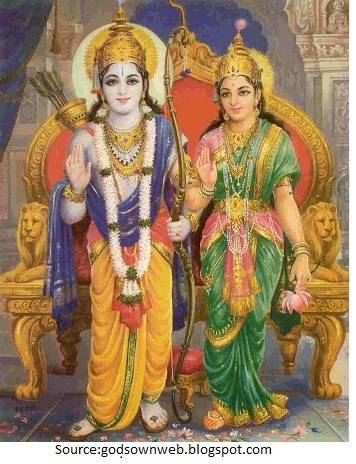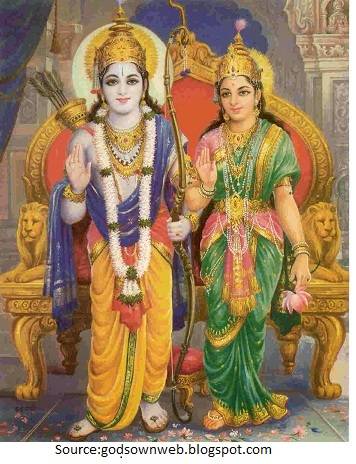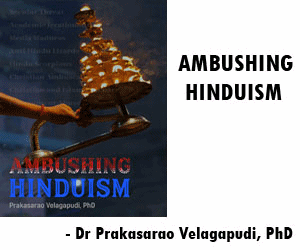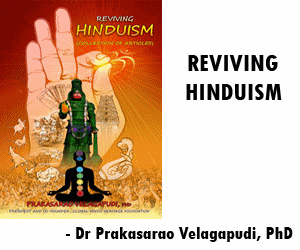Ramayana: Timeless message for Human Understanding - Part 2
Revised version of the paper resented at 25th International Ramayana Conference, Mysore, India.
(To read Part 1 click on this link)
http://savetemples.org/post/ramayana-timeless-message-for-human-understanding-part-1/613
 Sita – the Ideal Wife
Sita – the Ideal Wife
Rama is a dharma purusha - always did the right thing. He never questioned his father’s orders. He accepted wholeheartedly to go to the forest because he wanted his father’s words would remain true. He is highly balanced and composed; never succumbed to the emotions. He never intended bad to anybody.
After Rama was exiled as per the wish of Kaikeyi, he did not want Sita to accompanying him to the forests because of potential danger, lack of comforts and arduous journey. He explained the possible dangers of life in the forests. She loved him so dearly that she did not want part with him for fourteen years. To convince him, Sita talked about the responsibility of wife. Her reasoning was so powerful, convincing and exemplified the virtues that made her renowned, famous and ideal wife.
Granting that husbands duty is protect his wife, care for her and fulfill her desires. In return wife should show fidelity to her husband by serving faithfully to her husband. In fact, Rama advises his mother who wanted to accompany Rama to the forests by saying, “As long as she lives, a woman’s God and master is her husband. Even a pious woman given over to fasting and spiritual practices … is treading on an evil path if she be not attentive to her lord.” Advancing the same argument, she tried to convince Rama to take her to the forests. She said:
"If you had been banished to the Dandaka forest, then so have I. I will go with you, Rama; my place is at your side. With you, I would walk down the paths of ***. The jungle will be like heaven for me. I must disobey you in this, my love; forget my disobedience, as you do the water you leave behind in a glass after drinking”
"But a wife, and she alone, bull among men, must share her husband's fate. Therefore I, too, have been ordered to live in the forest.
"It is not her father or mother, not her son or friends or herself, but her husband, and he alone, who gives a woman permanent refuge in this world and after death.
"If you must leave this very day for the trackless forest, Rāghava [Rāma), I will go in front of you, softening the thorns and sharp kuśa grass.
"The shadow of a husband's feet in any circumstances surpasses the finest mansions, an aerial chariot, or even flying through the sky.
“I shall live as happily in the forests as if it were my father's house, caring for nothing in the three worlds but to be faithful to my husband.
“I will obey you always and practice self-discipline and chastity. What pleasures I shall share with you, my mighty husband, in the honey-scented forests!
"O Rāma, bestower of honor, you have the power to protect any other person. Why then not me? “You need not doubt that I can survive on nothing but fruit and roots; I shall not cause you any trouble by living with you.
“If I were to be offered a place to live in heaven itself, Rāghava, tiger among men, I would refuse it if you were not there.
“I will go to the trackless forest teeming with deer, monkeys, and elephants, and live there as if in my father's house, clinging to your feet alone, in strict self-discipline.
“I love no one else; my heart is so attached to you that were we to be parted I am resolved to die. Take me, oh please grant my request. I shall not be a burden to you.
The values enshrined in Sita are appreciated by Swami Vivekananda who said, "All our mythology may vanish, even our Vedas may depart, and our Sanskrit language may vanish forever, but so long as there will be five Hindus living, even if only seeking the most *** patois, there will be the story of Sita present."
Surpankha’s advice to Ravana (Aranya Khanda, Chapter 33)
It will be surprising to note that of all the people, Surpankha (Ravana’s sister) talks on administration! After her mutilation (cutting off her nose and ears) by Lakshmana for her foolish misadventure, she rushes to Ravana’s court and criticizes him on his lapses in Public Administration and tenders him advice on good government.
‘A greedy king, who is addicted to sensual pleasures and who acts at his sweet will and pleasure is avoided by his subjects like the cremation fire."
"A king who fails to attend to his duties personally at proper moment, hastens his downfall and ruins himself and his realm."
"If a king is ruthless, stingy, indifferent, proud and arrogant, his subjects will not come to his rescue in his times of crisis."
"A king who thinks too much of himself, who is evasive, self-conceited and ever irritable has to be mortally afraid even of his own kith and kin."
"Kings are said to be far-sighted because they can easily visualize the distant calamities with the aid of spies."
"That king alone who is discreet, erudite, self-controlled, grateful and who obeys the divine law, can rule his kingdom well."
"That king is verily worshipped by his subjects, who though physically asleep is mentally awake, and does not indiscriminately punish or reward them."
‘A slanderer, one steeped in worldly pleasure, one who is not in tune with time and one who cannot discriminate the good from the bad, loses his empire and perishes soon."
It will be evident from the foregoing that the rich heritage enshrined in the Ramayana shines through every facet of the epic, like the sophisticated instructions on Public Administration, that have eternal relevance to humanity. That is why the epic ‘Ramayana’ is described as the ocean full of gems and the prime role of the human Avatara (incarnation) is to educate humans on all aspects of the art of living.
Rama’s Gratitude
Rama Praises His Devotees
Turning to Vibhishana, Rama said, "Dear friend, you have set forth an example of loyalty to truth in face of immense adversity. Against all odds you stood behind me. As an acknowledgment of you steadfastness and devotion I would like you to take the throne of Lanka. Rule with honesty, justice, simplicity and fear of God. May you and your people prosper ever hereafter."
But Vibhishana protested. He said, "O lord, a devotee has no value for the riches, wealth, wine and woman. Let me serve your holy feet; do not burden me with this duty of a king." Rama pacified the upsurge of these noble thoughts and said to Vibhishana, "No, you are the fit person to rule your people. They have already suffered a lot. Moreover, let me show to the world through you, that my devotee can be rewarded both with love and material comfort. You will have best of both the worlds."
Then turning to Sugreeva, Rama praised his friendship and cooperation. Sugreeva was also given warm send off and was told to rule Kishkindha for the welfare of monkey clan.
Lord Praises Hanuman
Hanuman was standing with his eyes focused at the holy feet of Rama. He was modesty, humility, and devotion personified. Rama turned to him and lovingly said,
"O my greatest devotee, what should I offer you! Your devotion for me cannot be described in words nor can it be compared with any other. Your superhuman efforts in locating Sita and your great feat to bring the whole mountain to save life of Laxmana will be remembered for ages to come. Your intelligence, strength, and devotion will inspire many to worship you as their Ideal God. I bless you and offer a boon that you shall have a permanent seat wherever my story is recited, heard, told, read or written. You will be known as Veer (powerful) Hanuman. O son of wind, whosoever takes your name, seeks your help, prays for assistance, whosoever remembers you in distress or difficulty or calamity, that person with your blessings will become free from the trouble. Therefore, you will also be known as Sankat-Vimochak, waiver of disaster and distress." Humble Hanuman bowed down to Rama's feet and took the dust to his head.
Hanuman exemplifies selflessness, courage, devotion, energy, strength and righteous conduct. He stands for the potential that is inherent in all of us. He also represents the air, the atmosphere and thus the life-breath - the prana. Sita is believed to have bestowed on him the boon which made Hanuman ever-youthful, energetic and immortal.
 Sri Rama’s advice to Bharata
Sri Rama’s advice to Bharata
The Ayodhya Kanda, the second chapter, contains comprehensive lessons on good governance. When Bharata, the younger brother of Rama, goes to meet the latter in the forest to request him to return to Ayodhya and rule, the two brothers enter a long and instructive dialogue.
Highly principled Bharata when he came to know that his mother was responsible for Sri Rama’s exile was tortured by the agonies of grief, anger and guilt. Wearing Jata (hair bound in knot) and bark garments he proceeds from Ayodhya, along with its entire population, to persuade Sri Rama to return. After their momentous and affectionate meeting at Chitrakut, Sri Rama addressed Bharata on the art of administration, which is exhaustively detailed in the Ayodhya Kanda of the epic known as the famous '‘KacchitSarga’.
When Lakshamana suspected Bharata’s intentions, Rama pacified Lakshmana by saying that Bharata was coming in agony and solely with the purpose of offering the Kingdom to Sri Rama. Hence, questions addressed to Bharata were obviously not intended for him alone, but they were guidelines meant for the benefit of those who wished to get educated on the principles and art of efficient administration!
As Bharata was to rule the kingdom as per the King’s promise to queen Kaikeyi, Sri Rama enquires of Bharata whether he was ruling the Kingdom efficiently. He was also asked to explain by Sri Rama why he had left his post of duty and come to the forest.
In this context, Sri Rama enquires of Bharata and instructs him extensively on the finer points of the art of administration. This address highlights the duties and responsibilities of Kingship covering all aspects and the entire range of administration in which a King should attain proficiency if he was really concerned with the happiness and welfare of his subjects. Sri Rama says to Bharata
“I hope you do not eat by yourself nicely made eatable and do you share it with your friends, who seek it?, A wise and learned king, having obtained and ruled the entire earth, properly by righteousness and by administering justice to the people, indeed ascends to heaven when detached from the mortal body.”Ayodhya Kand, Chapter 100, Verses 75 and 76)
Rama counsels Bharata on governance. From quality of ministers and the importance of strategy sessions, to temperance in administration to justice, Rama expounds on all the subtleties of statecraft in a lucid manner. Apparently, Rama seems to be inquiring of Bharata his well-being, whether all is well at Ayodhya - in fact, however, in the process, the lessons on effective governance are offered in a powerful manner. Though the dialogue between the two brothers runs into several pages and a thorough reading is required to understand the intricacies, some important lessons are obvious, particularly the ones given on pages 441-449 of the Valmiki Ramayana.
 A critical factor in good governance is the quality of ministers. Rama asks Bharata whether he has appointed courageous, knowledgeable, strong-willed men with a high emotional quotient as his ministers, because quality advice is the key to effective governance. The emphasis is on competence and confidentiality. Rama's advice to Bharata is to take a decision on a complex issue neither unilaterally nor in consultation with too many people. There should be an efficient core group.
A critical factor in good governance is the quality of ministers. Rama asks Bharata whether he has appointed courageous, knowledgeable, strong-willed men with a high emotional quotient as his ministers, because quality advice is the key to effective governance. The emphasis is on competence and confidentiality. Rama's advice to Bharata is to take a decision on a complex issue neither unilaterally nor in consultation with too many people. There should be an efficient core group.
A good administrator can ensure high returns from minimum investments. Rama tells Bharata to prefer one wise man to a thousand fools as it is the wise who can ensure prosperity during an economic crisis. Even if there is one minister who is effective, the king will gain immensely. Appointing tested men of noble lineage and integrity for strategic positions is the key to successful government. Moderate taxes should be levied on the people, lest they revolt. Rama wants Bharata to treat his soldiers well and pay their legitimate wages on time. Delays in payment of wages and other allowances can lead to dangerous consequences.
Trade and agriculture are important, and Rama wants Bharata to ensure good irrigation facilities rather than being overly dependent on rains. Traders need to be ensured of a fear-free environment and their grievances should be redressed promptly.
Protecting the forests and maintaining livestock have also been dealt with as important aspects of effective governance. In fact, the vision of the Ramayana has eternal relevance. Law and justice, finance and business, corruption framing of innocents for monetary gains, injustice to the poor are all mentioned.
Rama's words of advice to Bharata are as relevant today as they were in the Treta period, the time when Rama is believed to have lived. It is worthwhile to ponder over the thoughts and deeds of Rama rather than expend valuable time and energy fighting over his birthplace and whether a temple should be constructed there. For the benefit of present and future generations, Rama gave valuable tips to Bharata on good governance. We should focus on this aspect rather than on outward worship.
Rama’s timeless pearls of wisdom started with human relations at home, Bharata’s personal conduct and self-discipline, the questions cover his reverence and service to his parents, teachers and elders to ensure domestic harmony. His advice includes the governance of different departments in government such as Home Affairs, Defence, Foreign Affairs, Finance, Labor Relations, Agriculture and Taxation. Examples of his advice are listed below:
- Tender service to the father
- Hold high esteem toward gods and manes, dependents, elders, kinsmen of your father’s age, the aged, the physicians as well as the Brahmanas
- Appoint valiant ministers who have high pedigree and discretion like Bharata
- Accept advice given by experienced ministers well versed in the laws of truth and virtues
- Appoint learned people who will bring endless glory by solving knotty problems.
- Prefer learned men to thousands of fools and evil minded
- A single minister who is wise, brave, clever and discreet, he will bring fame and prosperity to a King big or small."
- Appoint Commander-in-chief who is gallant, talented, of spotless character and well-born and devoted and clever.
- Distribute the monthly salary due to the employees at the proper time without delay.
- Do not patronize Atheists Brahmins since they are skilled in perverting the minds of people."
- Make sure that Vaisyas are they thriving well in agriculture and animal husbandry
- Income should be sufficiently large to meet your expenses and your expenditure comparatively less.
- Protect women folks well
- Keeping milch-cows in abundance with you
- Greet your teachers, and elders, ascetics, deities and unexpected visitors as well as the trees standing on crossroads
- Consult in accordance with only four or three (selected) counselors collectively or severally to guard against a split among them and to prevent the secrets from leaking out
Sri Rama concludes the illuminating address thus:
 "Having obtained as his share and ruled in the right way over the entire globe, a wise king holds sway over the earth and administering justice to the people quite in consonance with righteousness, surely ascends to heaven when detached from his body."
"Having obtained as his share and ruled in the right way over the entire globe, a wise king holds sway over the earth and administering justice to the people quite in consonance with righteousness, surely ascends to heaven when detached from his body."
If people in Bharat are not prepared to learn, understand, digest and practice the ideals of dharma, truth and peace, who will do it?
If people of Bharat cannot protect its heritage, who will do it for her.
If people of Bharat cannot take pride in implementing the advice of Dasaratha, Rama, Vibhishan, Sita, Mandodari, Surpanakha, Hanuman and others, who will implement it?
If the sons and daughters of Bharat openly malign the values of Ramayana days, back stab them for their personal gain and greed, who will preserve them?
If the rulers of Bharat cannot even teach their children the virtues of Ramayana, what right do they have to rule the land.
How long the children of Bharat look the other way ignoring their own rich cultural heritage expounded in Ramayana.
How long do they want to remain silent and allow our heritage to be bulldozed by adharmic forces?
It is in the hands of the children of Bharat to practice it, preserve it and protect it. They must consider appropriate measures to revive, restore and revitalize the dharmic values explicated in Ramayana.
Please subscribe to Save Temples Telegram channel at https://t.me/savetemples











 Urgent support needed for Bangladesh Hindus
Urgent support needed for Bangladesh Hindus 







